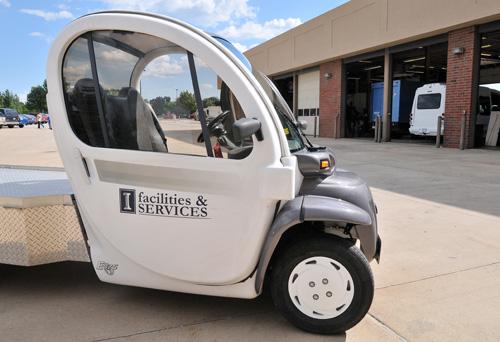Gas prices stretch University’s budget

July 1, 2008
Gas is now, on average, more than $4 per gallon in the state of Illinois. If people do not have to drive, they don’t. Unfortunately, some gas use cannot be avoided.
High prices have begun to affect the University in a variety of ways.
“On all of our new vehicles, we are monitoring the idle time on them,” said Pete Varney, associate director of the University’s garage and car pool. “We want to reduce the amount of time the drivers are idling.”
Varney said that between July and April, Facilities and Services vehicles went through as much fuel as in the preceding 12-month fiscal year. He said he has not looked at how much more they have spent, but it could be as much as $60,000 just for Facilities and Services.
“I try to prepare a budget on an annual basis,” Varney said. “Still, I may have to revisit that if fuel continues to fluctuate as much as it has.”
Get The Daily Illini in your inbox!
This year, Varney said they will most likely be looking for more money for fuel costs alone, and those prices may be taking money away from other areas.
“Every dollar that F&S; spends on fuel is one dollar less that they can spend on repairing something on campus,” Varney said.
Varney also runs the car pool, which loans out cars to University faculty and staff for them to use for various trips. Of all areas, travel has not started to become affected just yet. Still, Varney said he believes University departments may become more frugal as gas prices continue to increase.
“I expect people to start saving what they can when they are traveling,” he said.
Tom Galer-Unti, budget director for the College of Media, said the college has not had to start making cuts for traveling, but they are trying to be economical.
“We try to encourage traveling be done only when it is necessary,” Galer-Unti said, adding that if trips can be done by airplane, then that method of travel is used.
Currently, Galer-Unti said they have not attempted to look at the impact of how the high gas prices will affect travel, but a lot of trips are depending on the state’s budget still being debated between Gov. Rod Blagojevich and the Illinois Legislature.
Even if individual schools take trips to travel, there are some departments, such as ACES, that use gas just to do their research. ACES students and faculty need gas to power the machinery they use to keep up the 1,300 acres they farm.
“We cannot short step what they need to do in order to get to their research goals,” said Robert Dunker, who is in charge of Crop Sciences for ACES.
Dunker said that higher fuel costs in the last 10 years have greatly affected operations on the farms, but gas is a necessity to keep going, especially during planting and harvesting seasons with the most state-of-the-art technology.
“We do make decisions for efficiency, but the bottom line is that there is a lot of fuel used for day-to-day operations,” he said. “It may cause us to do some things different than we would normally do.”
ACES has taken steps to become more fuel efficient though, Dunker said. On some of the farmland not used for research, the workers have begun planting soil before tilling.
“We can’t do that on everything, but where we can do it, we do,” he said.






